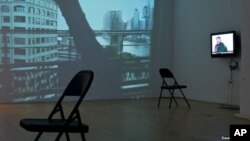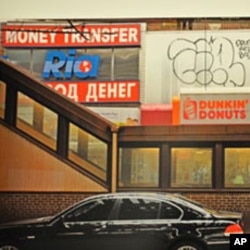Two Kyrgyz artists keen on exposing the follies of human illusion have set their sights on shattering misconceptions that foreign laborers might have when leaving home to pursue the good life in the Big Apple.
Through a new visual art installation dubbed "Brooklyn Bridge," Bishkek-based artists Gulnara Kasmalieva and Muratbek Djumaliev have specifically drawn attention to the plight of Central Asian immigrants in New York.
The exhibit, on display at the Winkleman Gallery in New York's artsy Chelsea neighborhood, features four monitors in which three Kyrgyz and one Uzbek immigrant talk about their experiences in pursuing the American dream.
On the opposite walls, a video installation shows the view out of a subway train as it moves across the Brooklyn Bridge in slow motion. Those images are complemented by four large photographs of daily life in Brighton Beach, the center of New York's Russian-speaking diaspora.
The idea, Djumaliev said, is to highlight the rosy ideas immigrants may have about New York, the United States, and their own homeland.
"While they are going to the United States they have certain illusions about the United States, for example. And when they are there, after some time, they have another illusion about their home. So they constantly produce this kind of illusion," Djumaliev said.
"And in this sense I think it is very good, this work, because it's about human illusion, about desire, about the wishes, about the disappointments, about everything - about the illusions of people," Djumaliev added.
Initial Hardships
The four interviewees, who are left anonymous, at times inject comedy into the subject. One woman speaks animatedly about her favorite clients when working as a maid in Florida - businessmen, she said, because they barely used the rooms and still left $50 tips.
But the seriousness of their message is clear: living in America is not what he or she expected. A middle-aged Kyrgyz man said that for many immigrants, the first year is very difficult.
"Mentally, probably one tries to forget all that [is happening at home]," he said. "After about a year and a half, especially if something goes wrong with work, everyone
they are leaving."
The women and men expressed very different opinions on the difficulties faced by the opposite sex and how relationships suffer, whether or not a spouse is left behind.
One man said the transition is easier for women because they are more adaptable, while one of the women said the transition is easier for men because they can move on and forget the family they left behind.
Leaving Home Behind
Djumaliev and Kasmalieva said the 2008 recession has resulted in fewer Central Asian immigrants coming to New York, with many opting to head to Russia instead.
But of those who come to the Big Apple, according to Djumaliev, many do so illegally. And this, he says, offers little opportunity, with many doing manual labor, cleaning, or working as a nanny, irrespective of their education.
Djumaliev said immigrants most often move to New York so they can send money back to their families, often even leaving young children and spouses behind for years on end.
"Why we call this installation and we call our artwork 'Brooklyn Bridge' is because all these people they're, every time [they] sort of doubt [whether] they should be in the United States or come back home," Djumaliev said.
"Because on the one hand they have certain work, certain jobs, and they can send money back home to their families. And at the same time they separate from their families for a long time, for several years, even for 12 years sometimes," he added. "So it destroys their family, and destroys their relationship with all their friends and relatives, and the country."
The point isn't to say that a migrant's life in America is all negative. "America is a unique country in the way that there is a place for everyone," said one of the Kyrgyz women interviewed. "Whoever you are, you will survive and find a place."
| Find more coverage at RFE/RL |

